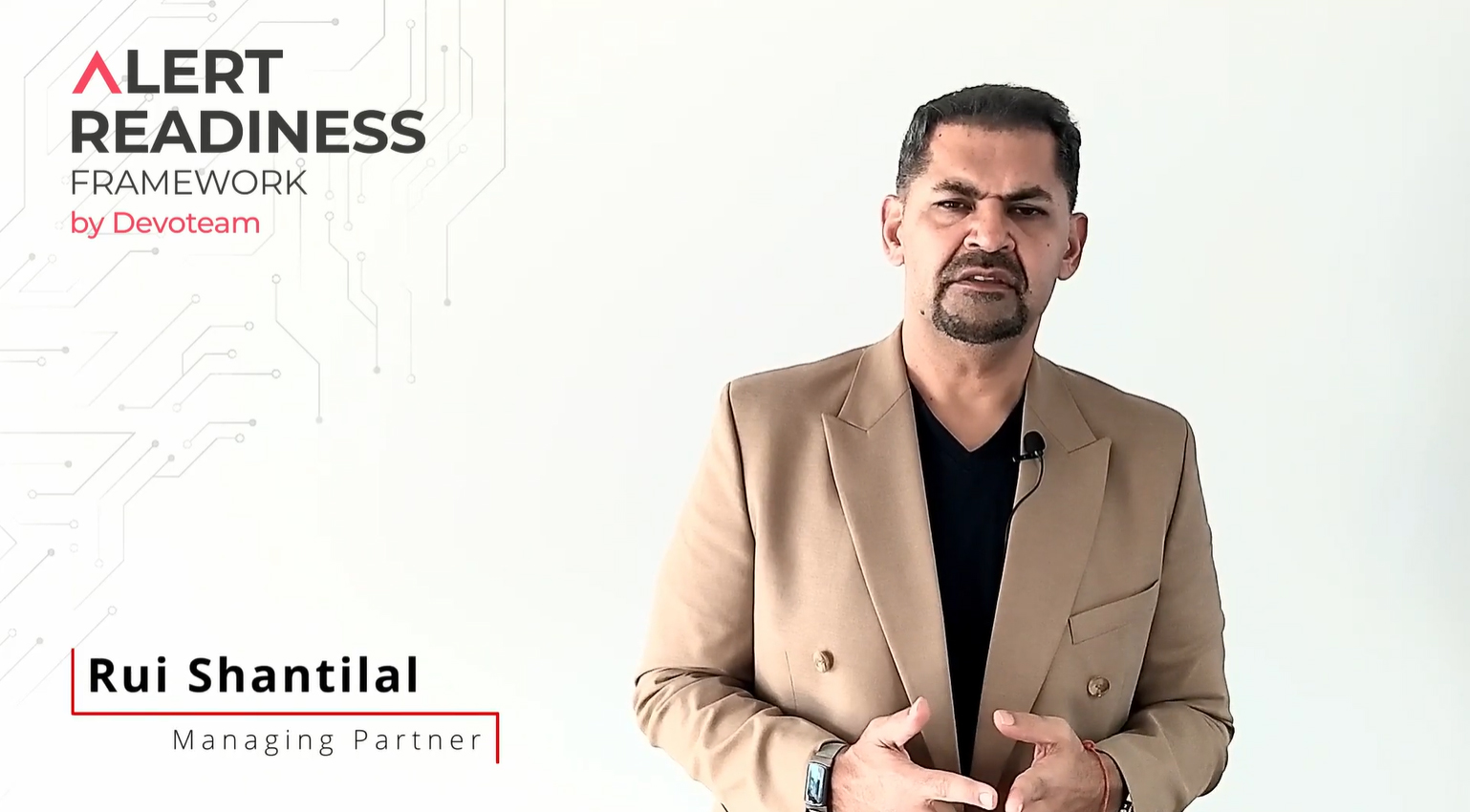Alert Readiness Framework
Bridging Business and Cybersecurity in a Modern Framework — Pioneering a Business-Centric Approach to Achieve Cyber Resilience in Today’s Digital Age.
Alert Readiness Framework represents a new era, where business and cybersecurity are intertwined, driving resilience and value in an ever-evolving landscape.
The defense readiness condition (DEFCON) is an alert state used by the US Military for decades. ARF enables the cybersecurity industry to adopt the same mindset.
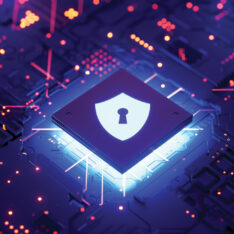
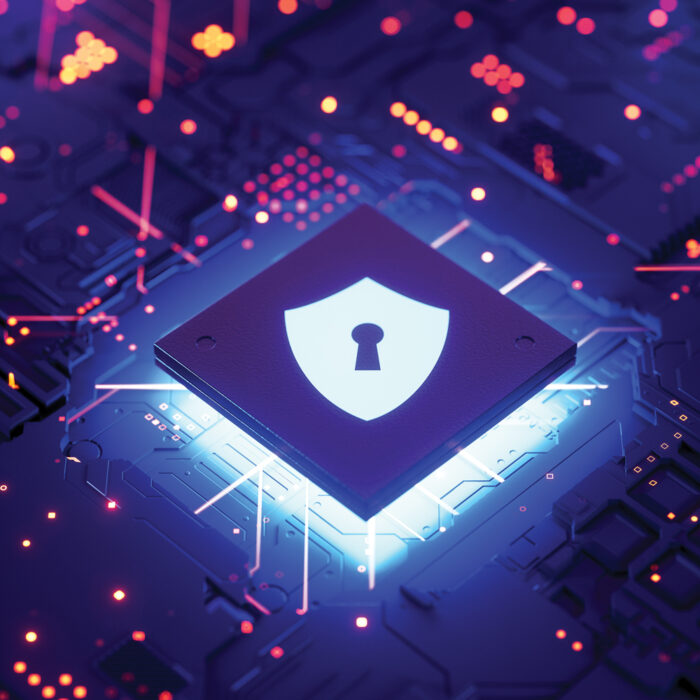
An Innovative Approach to Cybersecurity
What is ARF? The Alert Readiness Framework (ARF) is a cybersecurity framework that introduces a alert level system, similar to that used in military contexts. Developed by Devoteam Cyber Trust, ARF enables organizations to implement adaptable and context-aware security controls and response plans based on real-time threat levels.
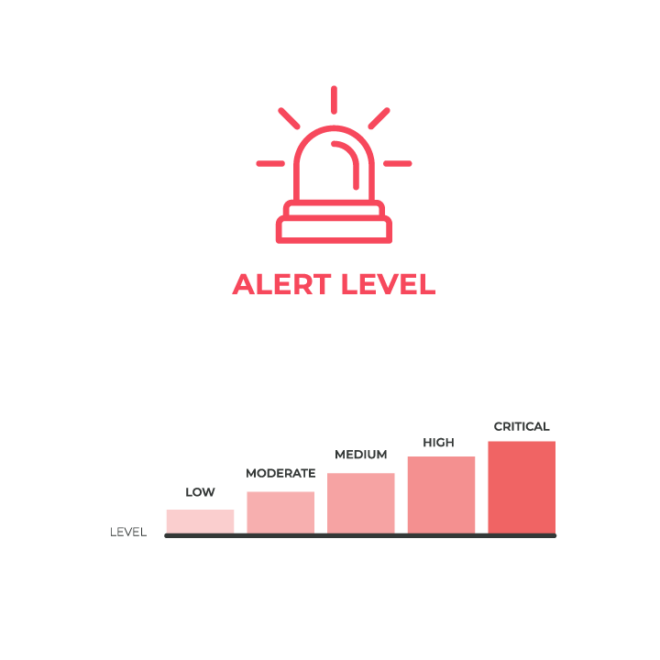
What is its purpose?
ARF aims to achieve the following objectives:
- Establish Alert Levels:
Implement an alert system that varies according to the severity of cyber threats. - Contextualized Response Plans:
Associate each alert level with a specific set of controls and actions. - Common Language for All:
Create a common cybersecurity language that is understandable to everyone in the organization, from the CEO to regular employees.
The four pillars of the Alert Readiness Framework
- Technology: Tailored tech solutions are aligned to each alert level, ensuring tools and infrastructure are optimally utilized.
- People: Training and awareness are synchronized with the ARF levels. As threats escalate, people are prepared and aware of their roles.
- Process: Defined processes for each level ensure a coordinated and seamless response.
- Business Controls: Beyond just the technical, ARF aligns business controls with cybersecurity measures, ensuring business continuity even in heightened alert situations.
ARF provides organizations with a clear, scalable, and business-centric approach to cybersecurity. It’s about being prepared, proactive, and always aligned with the evolving threat landscape.
Get ready to explore ARF’s First Edition now!
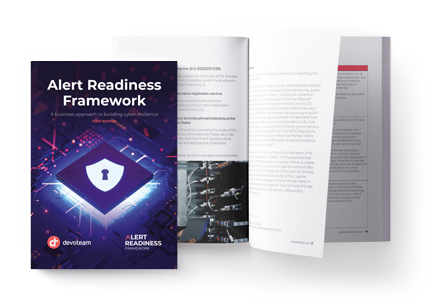
The complete framework is already available and you can download it for free.
A dedicated member of our team will reach out to you personally to discuss how we can assist you in seamlessly integrating this valuable framework into your organization’s operations.
FAQ
Check our Frequently Asked Questions to know more about Alert Readiness Framework (ARF)
Alert Readiness Framework is a paper, a set of guidelines. The framework is based on 2 main pillars: setting up a dynamic alert level dashboard and being ready to deploy an action plan specific to each alert level.
It’s a registered trademark, developed with the investment of Devoteam.
The success of any business today is heavily dependent on technology, making cybersecurity an essential component of overall business strategy but usually cybersecurity management practice focuses on technical controls and support processes such as legal, compliance, HR but not necessarily on the effective business aspects. Cybersecurity should no longer be considered in silos.
The Alert Readiness Framework is designed to help organizations take a more proactive and holistic approach to managing their cybersecurity risks. By establishing an alert state system and preparing all business processes, support processes, technology, and people to respond to each alert level, the framework can help organizations identify potential security threats and respond proactively to prevent them from becoming disruptive to the business.
By adopting the ARF, organizations can build a strong cybersecurity posture focused on critical assets and processes, using a risk-based approach to identify and manage cybersecurity risks. This, in turn, can help to ensure that the organization is more resilient in the face of evolving cyber threats.
By adopting a more integrated and proactive approach to cybersecurity, organizations can better protect themselves against the rising threat of cybercrime and ensure the continuity of their critical business functions.
Build Cyber Security Resilience: the ARF will make businesses more resilient by lowering the impact of incidents.
The framework helps organizations to:
- Reduce the opportunity for incident to occur
- Reduce the impact in case it still occurs
- Have a strategic approach of the cybersecurity investments with the use of a dashboard
- Align all organisation towards Cybersecurity readiness
- Every resource as part of extended cybersecurity team
- Controls
- Improved / continuous
Implementing the Framework aid to reduce the costs of IT security
Security is a trade-off:
- Cost-benefit analysis
- Security vs. Usability
- Higher risk = more controls = more tradeoff
Ensuring an adequate level of resilience against threats targeting information and communication technologies is an act of balance for those responsible. Striving for a higher and more mature level of security increases the impact on the business and their processes. Further, the costs for maintaining a new and higher level of security increase. Resulting from investments in the following areas:
- Implementation of new controls
- Improving existing controls
- Implementation of new security services and technologies
- Increasing the head count for personnel with a security related role
- Education of existing personnel
These costs directly relate to security. As stated previously there is a higher impact on the business which also translates into a potential increase in costs. The evaluation needs to be done in close alignment with the business in order to get valid and reliable estimations. With this information at hand senior management and decision makers can get a clear understanding of the costs directly, indirectly and overall related to a certain level of security.
The Alert Readiness Framework positively affects the cost for security with the utilisation of the security levels. The levels are increased and decreased by defined circumstances and corresponding controls are active only for the current level. Resulting in an increase of costs for ascending levels consequently only for the time they are active.
C-Level management of mature companies/corporations which are already prepared to manage incidents and prepared their business continuity.
Services and expertises (Cyber Trust, Digital Impulse, Innovative Tech, Creative Tech).
The deliverables will be :
- Consultants trained to implement the Framework within the organisation
- The possibility to use GRC technology/customisation (integration with the organization tools).
